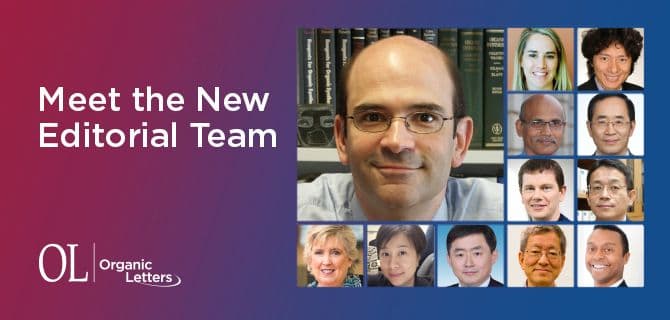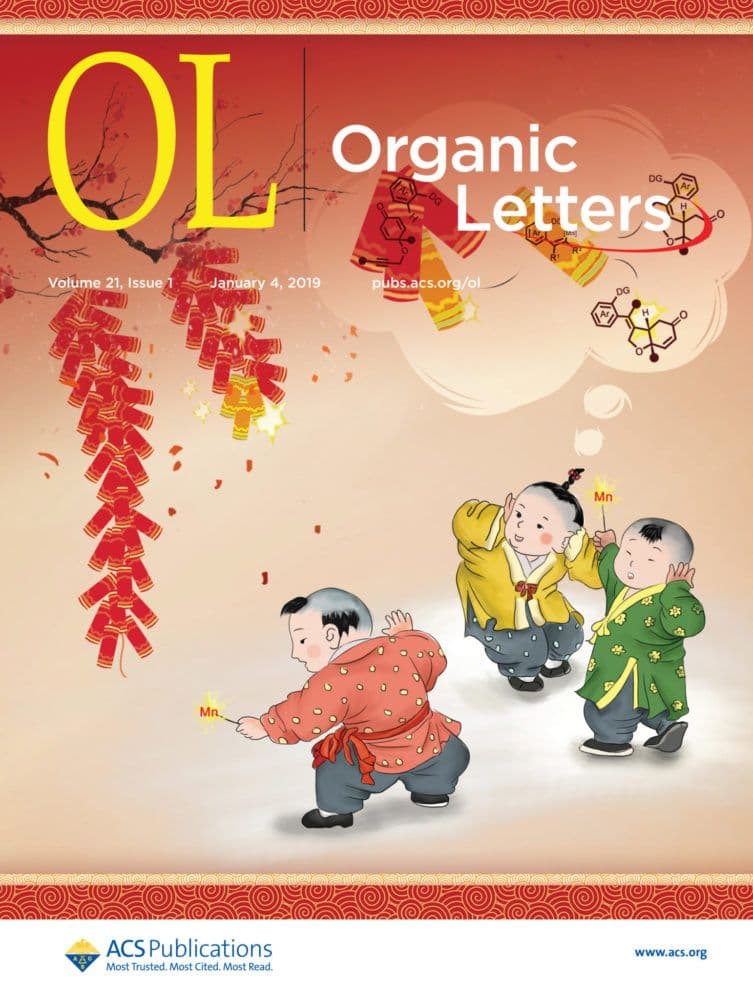New Associate Editors bring fresh perspectives and new experiences to their publications. This year, Organic Letters is excited to welcome a new team of Associate Editors, each of whom bring their own unique expertise. These new members will join 5 returning Associate Editors, and work under the direction of Erick M. Carreira, the new Editor-in-Chief of Organic […]

New Associate Editors bring fresh perspectives and new experiences to their publications. This year, Organic Letters is excited to welcome a new team of Associate Editors, each of whom bring their own unique expertise. These new members will join 5 returning Associate Editors, and work under the direction of Erick M. Carreira, the new Editor-in-Chief of Organic Letters (learn more about Carreira here).
Returning Editors:
Kuiling Ding
Hung-wen (Ben) Liu
Kavirayani R. Prasad
Zhenfeng Xi
Shigehiro Yamaguchi
Get to know the newest members of the Organic Letters team:
Margaret Brimble
As a new Organic Letters Associate Editor, how do you envision your contribution to the journal and the chemistry community? Our research group has very broad interests in drug development and discovery underpinned by using synthetic organic chemistry as an enabling science—we have experience in translating our research, for example with a drug in clinical trials for Rett Syndrome, and I am cofounder of a peptide cancer vaccine company, Sapvax. I therefore hope to contribute to the journal by not only understanding the fundamentals of organic synthesis but also how innovative organic synthesis enables discovery in the pharmaceutical industry.
All ACS Publications Editors are practicing scientists. Could you describe some of the key research areas your group is involved in right now? Our main areas are the synthesis of antimicrobial peptides with unusual and challenging structures, applications of lipopeptides for the development of vaccines and peptide hormones, the synthesis of antibody-drug conjugates, and the synthesis of novel spiroketal-containing natural products.
Beyond high-quality, cutting-edge research, what do you think makes a great Organic Letters article? I like to see a concise “snappy” article with well laid out structures that has a powerful take home message showcasing the work and where it sits relative to similar work.
When you’re not teaching and doing research—and working as a journal editor or reviewing papers—how do you spend your time? What are your passions outside of organic chemistry and your workday? I have to confess I have trouble leaving my work behind as I enjoy being with my talented group and reading/writing about organic chemistry. When I do escape, I really value the limited time I get to spend with my family.
Pauline Chiu
As a new Organic Letters Associate Editor, how do you envision your contribution to the journal and the chemistry community? I would do my best to invite reviewers who would give fair and balanced evaluations both in terms of expertise and locale, to give helpful feedback particularly to younger chemists, and to ensure that the most innovative, interesting, quality chemistry is published and showcased.
All ACS Publications Editors are practicing scientists. Could you describe some of the key research areas your group is involved in right now? We are interested in cycloadditions and the synthesis of medium-sized rings, carbene chemistry and its applications to synthesis, and copper-mediated reactions. Recently we have also started to work with a company on medicinal chemistry projects.
Beyond high-quality, cutting-edge research, what do you think makes a great Organic Letters article? Organic Letters makes an impact in the field because of its excellence and rigor. To me, this is not only the completeness of data, but also telling the whole story, seasoning the article with some things you have tried but did not work and how these negative results are interpreted. That scholarly depth makes a great read and adds to my understanding of the science.
When you’re not teaching and doing research—and working as a journal editor or reviewing papers—how do you spend your time? What are your passions outside of organic chemistry and your workday? I like to watch TV comedies, movies, cook, and travel. I also have a hobby of collecting mineral samples.
Nuno Maulide
Professor at University of Vienna and 2018 Scientist of the Year in Austria | Area of Expertise: Synthetic Methodology: Rearrangements, Asymmetric Synthesis, Total Synthesis
As a new Organic Letters Associate Editor, how do you envision your contribution to the journal and the chemistry community? I see this role as an opportunity to give back to the community and to directly contribute to Organic Letters’ growing standing as a premier journal for urgent research reports in organic chemistry.
All ACS Publications Editors are practicing scientists. Could you describe some of the key research areas your group is involved in right now? Our group has a very broad focus across synthetic chemistry. We have recently gained an interest in asymmetric synthesis and natural products total synthesis.
Beyond high-quality, cutting-edge research, what do you think makes a great Organic Letters article? Organic Letters has a format that is ideally suited for disclosure of short, urgent reports in organic chemistry. Thus, I believe a great article has a strong and easy-to-grasp message.
When you’re not teaching and doing research—and working as a journal editor or reviewing papers—how do you spend your time? What are your passions outside of organic chemistry and your workday? I’m an amateur pianist and have recently taken to performing in concert settings where the similarities between science and music can be explored. Besides that, I also enjoy reading and writing fiction—all nice ways to disconnect from our busy, busy everyday life.
Sarah E. Reisman
As a new Organic Letters Associate Editor, how do you envision your contribution to the journal and the chemistry community? In my opinion, Organic Letters is the premiere journal focused specifically on organic chemistry. My role as an Associate Editor is to help oversee the publication of papers that advance the field. Organic Letters is particularly unique in that it provides high-quality peer review with very short times from submission to publication. It is my job to make sure we maintain this high quality as we achieve those rapid publication times.
All ACS Publications Editors are practicing scientists. Could you describe some of the key research areas your group is involved in right now? The unifying goal of my laboratory is to discover, develop, and study new chemical reactions in the context of natural products synthesis. Much of my group is currently focused on target-directed synthesis of complex diterpenoids, but we also have an active program focused on nickel-catalyzed enantioselective reductive cross-coupling reactions. In a general sense, we often find ourselves developing new reactions to address a key strategic bond construction for a specific natural product.
Beyond high-quality, cutting-edge research, what do you think makes a great Organic Letters article? A great Organic Letters article, like any great scientific publication, should tell a story—a compelling narrative arc that flows smoothly from the introduction, through the experimental design and results, to a satisfying conclusion. Some of my favorite Organic Letters papers report a new strategy to make a complex molecule. The synthesis might not be complete, but the paper describes a creative synthetic strategy or key tactic, and demonstrates the feasibility of the approach.
When you’re not teaching and doing research—and working as a journal editor or reviewing papers—how do you spend your time? What are your passions outside of organic chemistry and your workday? I have two children, ages 5 and 7. When I am not at work, I am with my family attending soccer games, piano lessons, swimming lessons—and when we’re lucky, hiking and camping. My favorite thing to do is to swim in the lakes near my hometown of Bar Harbor, Maine, which unfortunately only happens a few times a year now that I live in California!
Tobias Ritter
Managing Director, Max-Planck-Institute; Prof. Dr. Max-Planck-Institute for Kohlenforschung | Area of Expertise: Catalysis for Late-Stage Functionalization Reactions
As a new Organic Letters Associate Editor, how do you envision your contribution to the journal and the chemistry community? I would like to work with the community and fellow editors to make sure that Organic Letters is a journal that every organic chemist studies and enjoys reading.
All ACS Publications Editors are practicing scientists. Could you describe some of the key research areas your group is involved in right now?We have always been excited about late-stage functionalization reactions, which, by necessity, maneuvered us into C-H functionalization chemistry. Catalyst design to enable a variety of useful C-X bond-forming reactions is our bread and butter, with fluorination reactions still playing a central role in my group.
Beyond high-quality, cutting-edge research, what do you think makes a great Organic Letters article? I always love it when, in addition to the actual reaction chemistry, I can learn about a new concept, an unusual reaction mechanism, or applied utility as part of the paper.
When you’re not teaching and doing research—and working as a journal editor or reviewing papers—how do you spend your time? What are your passions outside of organic chemistry and your workday? I have three kids! That should answer the question …
Jin-Quan Yu
As a new Organic Letters Associate Editor, how do you envision your contribution to the journal and the chemistry community? To select and share with the community some of the best findings and solutions concerning organic molecules.
All ACS Publications Editors are practicing scientists. Could you describe some of the key research areas your group is involved in right now? We focus on two challenges: enantioselective and remote C-H activation via metal insertionreactions.
Beyond high-quality, cutting-edge research, what do you think makes a great Organic Letters article?A penetrating and informative title and abstract often helps.
When you’re not teaching and doing research—and working as a journal editor or reviewing papers—how do you spend your time? What are your passions outside of organic chemistry and your workday? I have recently switched from playing soccer to table tennis.
